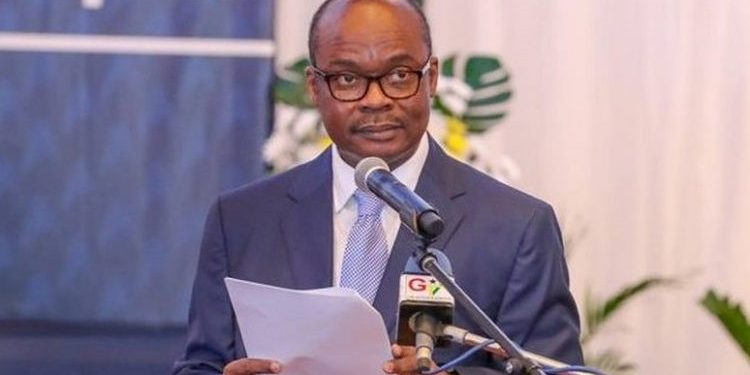Governor for the Bank of Ghana, Dr Ernest Addison has said, that measures put in place by the Central Bank on the back of the Covid-19 pandemic are now yielding results as economic activities have started to pick up.
Addressing the president on a surprise visit to the Central Bank, Dr Addison, stated that the adverse impacts of the pandemic which resulted in a significant slowing down of economic activities are gradually wearing off.
The Governor’s assertion comes on the back of the bank’s updated Composite Index of Economic Activity as well as the Business and Consumer Confidence Surveys conducted in June 2020.
“In Ghana, our economy has been severely impacted by the pandemic, as economic activities slowed down significantly, and impacted negatively on individuals and businesses. However, once again, your able leadership and globally acclaimed response to the pandemic is beginning to yield results. Economic activity which dipped significantly during the peak of the lockdown is already beginning to pick up as monitored by the Bank’s updated Composite Index of Economic Activity. The business and consumer confidence surveys conducted in June 2020 also shows some turnaround in sentiments reflecting the gradual lifting of the restrictions.”
He further stated that “the Bank’s response to the ongoing COVID-19 pandemic is a further demonstration of its constant adaptation to the needs of the economy while seeking to maintain price stability and financial stability. As central bank and banking sector regulator, the Bank of Ghana has responded to the unprecedented economic impacts of the pandemic with a number of policy and regulatory interventions including a reduction in its monetary policy rate, reduction of reserve requirements for banks and specialized deposit-taking institutions, reduction in the capital conservation buffer maintained by banks, reduction in provisioning requirements for certain categories of loans, and the purchase of Government bonds to support economic recovery efforts.”
According to Dr Addison, the quick recovery of the economy is attributed to the appropriate and timely policy and regulatory interventions by BoG, which includes a reduction in the policy rate as well as the reduction in the reserve requirements of banks and purchase of government bonds to support economic recovery efforts.
Speaking further, Dr Addison assured President Akufo-Addo of continuing the sound policy measures implemented to mitigate the adverse impacts of the Covid-19 pandemic as well as restoring confidence and preserving the stability of the Ghanaian economy.
“Your Excellency, we will continue with these sound policy measures aimed at restoring confidence and preserving the stability of the Ghanaian economy. In the aftermath of the pandemic, we will have to carefully unwind some of these countercyclical measures that we have implemented to return the macroeconomic environment to the pre-COVID path and allow the financial system to function without the regulatory forbearance that we have put into place to support Ghana’s Beyond Aid Agenda.”
We will also
The Central Bank in the meeting with the President promised to continue playing a key role in the sub-region, helping to shape economic cooperation and regional economic transformation initiatives within the West African Monetary Zone, ECOWAS, and the rest of the continent, even at a time that the AFCFTA has been signed and is expected to begin on January 1, 2021.
Meanwhile, Dr Addison, however, noted that the Central Bank in the aftermath of the pandemic will have to undo some of its countercyclical measures – reduction in the policy rate and reserve requirements – to return the economy back to a pre-COVID era.
In a related development, the Governor of the Bank of Ghana, Dr. Ernest Addison, told the President and his team that all customers of the nine failed banks and over 95 per cent of customers of Specialised Deposit-taking Institutions (SDIs), which were affected by the banking sector clean-up have received their full deposits.
He said, the first phase of the banking sector cleanup involved the revocation of licenses of nine banks, for which all depositors were paid in full.
But the second phase which has to do with the SDIs he said, “these are the savings and loans, microfinance institutions and finance houses. In their case, for individual depositors who have been fully paid, the data that we have suggests that more than 95% of depositors have been fully paid”.
Commenting on deposits of customers of GN Savings and Loans, and First Allied Savings and Loans, the Bank of Ghana Governor noted that, over the last three weeks, all customers have been paid.








